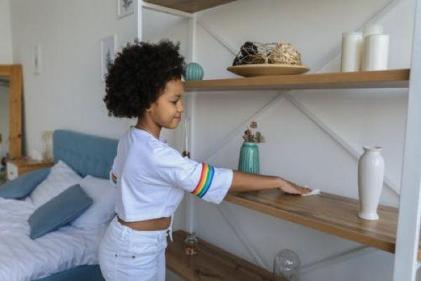As a parent, one of your most important roles, aside from basic care, is to nurture your child’s sense of self worth. It’s this sense of self esteem, after all, that will determine his social and personal interaction throughout life, and how successful he is likely to become. If you get it right, you should have a child who knows he is loved, and feels capable, most of the time, of handling life’s challenges.
Your first role as a parent in building your child’s self esteem is to love them unconditionally. As long as your child knows that he is always going to be loved by you, even if you sometimes don’t approve of his or her behaviour, then you’re off to a good start.
Set boundaries. It may seem strange, but having family rules that give your child structure is important to your child’s self esteem development. Make the rules, and then enforce them, and be consistent.
Give your child your undivided attention – even if it is only in short, well defined periods of the day. When you make your child the centre of your attention, you affirm that he is an important person in your life, and that’s crucial to your child’s long term self esteem development. Stop what you’re doing, and make eye contact with your child when he talks to you. Make a point of explaining when you can’t, or if you have to break away from the conversation for a while.
Allow your child to take some risks, and explore a little. They should be calculated, safe risks, like trying new foods, or venturing onto the swings, but they should allow your child the freedom to try, and fail, if necessary. If you’re always jumping in to help, you give your child the message that he cannot cope, or that your child needs to be rescued. That’s not good for self esteem.
Give your child a say! Try offering your child choices about what he wants to eat or wear on a particular day. Limit it to two choices, as two year olds struggle with more than that, but let your child be the one who decides.
Make it easy for your child to succeed! Buy clothes that he can cope with, or toys that are age appropriate, and that he will be able to master quickly. As the saying goes, success breeds success, and the more your child gets things right, the more he or she will be motivated to try next time.
Celebrate successes. If you maintain a positive outlook, focusing on what your child gets right, rather than what he or she gets wrong, then you foster an environment where you child will want to try new things. And the more he succeeds, and you praise that success, the more confident he will become.
Let your child make mistakes. There will be days when your child insists on doing, eating or wearing something you don’t agree with. Let them have their way, but make sure you have a backup plan anyway. If you never make mistakes you never learn, and the same goes for children.
Encourage your child. Just hearing you say that you believe in your child can give them the boost they need to try something new or difficult, and to keep going until they get it right. It costs nothing to be your child’s cheer leader, but it can have a profound impact on your child’s self esteem. Encourage your child to try, even if he is unlikely to succeed, and make sure that whatever happens, you make your child aware of how proud you are of the effort.
Be a good listener. Even a two year old will have things he or she wants to say. Stop, listen, don’t interrupt, and accept the emotions or feelings your child expresses. Even if you can’t indulge them, knowing that you understand, and respect your child’s right to have feelings, is an important step.
Your first role as a parent in building your child’s self esteem is to love them unconditionally. As long as your child knows that he is always going to be loved by you, even if you sometimes don’t approve of his or her behaviour, then you’re off to a good start.
Set boundaries. It may seem strange, but having family rules that give your child structure is important to your child’s self esteem development. Make the rules, and then enforce them, and be consistent.
Give your child your undivided attention – even if it is only in short, well defined periods of the day. When you make your child the centre of your attention, you affirm that he is an important person in your life, and that’s crucial to your child’s long term self esteem development. Stop what you’re doing, and make eye contact with your child when he talks to you. Make a point of explaining when you can’t, or if you have to break away from the conversation for a while.
Allow your child to take some risks, and explore a little. They should be calculated, safe risks, like trying new foods, or venturing onto the swings, but they should allow your child the freedom to try, and fail, if necessary. If you’re always jumping in to help, you give your child the message that he cannot cope, or that your child needs to be rescued. That’s not good for self esteem.
Give your child a say! Try offering your child choices about what he wants to eat or wear on a particular day. Limit it to two choices, as two year olds struggle with more than that, but let your child be the one who decides.
Make it easy for your child to succeed! Buy clothes that he can cope with, or toys that are age appropriate, and that he will be able to master quickly. As the saying goes, success breeds success, and the more your child gets things right, the more he or she will be motivated to try next time.
Celebrate successes. If you maintain a positive outlook, focusing on what your child gets right, rather than what he or she gets wrong, then you foster an environment where you child will want to try new things. And the more he succeeds, and you praise that success, the more confident he will become.
Let your child make mistakes. There will be days when your child insists on doing, eating or wearing something you don’t agree with. Let them have their way, but make sure you have a backup plan anyway. If you never make mistakes you never learn, and the same goes for children.
Encourage your child. Just hearing you say that you believe in your child can give them the boost they need to try something new or difficult, and to keep going until they get it right. It costs nothing to be your child’s cheer leader, but it can have a profound impact on your child’s self esteem. Encourage your child to try, even if he is unlikely to succeed, and make sure that whatever happens, you make your child aware of how proud you are of the effort.
Be a good listener. Even a two year old will have things he or she wants to say. Stop, listen, don’t interrupt, and accept the emotions or feelings your child expresses. Even if you can’t indulge them, knowing that you understand, and respect your child’s right to have feelings, is an important step.



